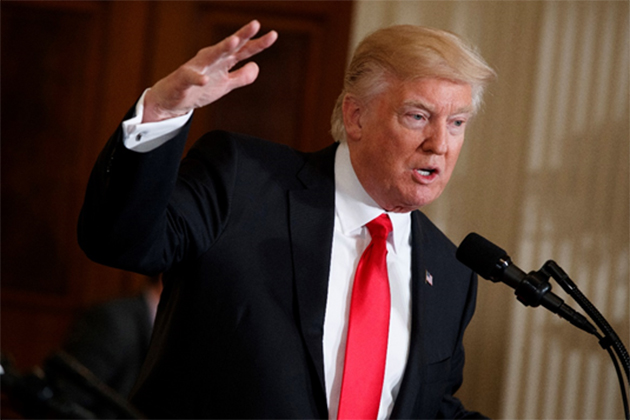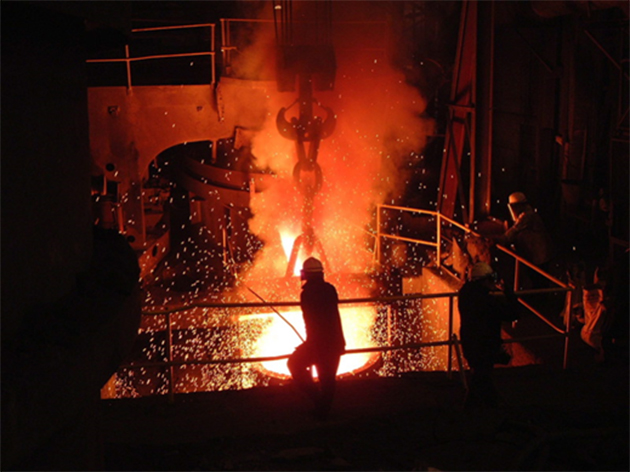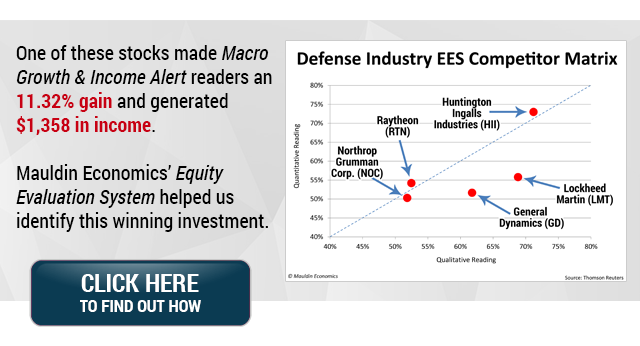| -- | July 18, 2017 Trump’s Terrific Trade War By Patrick Watson Like him or not, you can’t deny that Donald Trump thinks big. All his ideas are huge, beautiful, unbelievable, fantastic. “I have the best words,” he once claimed, and he’s probably right. I’ve been trying to guess what he will call the trade war he plans to launch any day now. Speaking to reporters last week, the president said China is “dumping steel and destroying our steel industry. They’ve been doing it for decades, and I’m stopping it.” Notice the alliteration? Dumping, destroying, doing, decades. Nicely done. In that spirit, I propose to name the collection of forthcoming tariffs and quotas, “Trump’s Terrific Trade Tempest.” This conflict won’t end with steel, nor will it be quick. Other governments will fire back. They’re already taking aim. 
Source: AP Loving Loopholes Last summer at the Camp Kotok economics retreat, I met a man who has done business with the Trump Organization and with Trump himself. The event’s ground rules prevent me from telling you his name, but I can tell you what he said. My source said Trump scrupulously followed the law in all their deals. He also said Trump would often insert innocent-looking contract clauses that later harmed the other side. The point: Trump loves holding people to terms they don’t know they’ve agreed to. If he can’t find a loophole to exploit, he may create one. That might be legitimate in commercial deals. However, it could backfire in unforeseen (and very non-terrific) ways if he tries to pull the same on the government of a foreign country. I agree that American workers don’t get fair treatment under international trade agreements like NAFTA. Trump wants to renegotiate or withdraw from those trade deals, but the US’s trading partners naturally object, as do some members of Congress. But here’s the loophole: It turns out a president can ignore or override many trade agreements without asking anyone’s permission if he finds that they harm US national security. In those circumstances, a 1962 law empowers him to impose tariffs, quotas, and other trade barriers. World Trade Organization (WTO) rules let member nations claim a national-security exemption to trade agreements. The provision’s parameters are unclear, because WTO members rarely go to war with each other—but Trump seems ready to test those parameters. 
Photo: Bryan Ledgard via Flickr Steel will only be the test case. Rather than work through cumbersome existing processes, President Trump ordered Commerce Secretary Wilbur Ross to study the national-security implications of steel dumping. Ross should release his findings soon—but we can guess what they will be. As the Washington Post reported last Friday… Members of the Senate Finance Committee who emerged from a briefing with Secretary Ross Thursday afternoon said it’s no longer a question of whether Trump acts to protect American steel, but how severely. In other words, the decision is made. Trump’s Terrific Trade Tempest is on the launch pad. Combative Mood The law gives Trump flexibility. He could act only against China or other countries as well. The possible targets are already squawking—and planning their responses. For instance, consider this July 7 Financial Times article: [European Union] officials have begun assembling a list of US goods including whiskey, orange juice and dairy products to target for retaliation over Donald Trump’s plans to invoke national security concerns to limit steel imports. European Commission president Jean Claude Juncker told the Financial Times, “Our mood is increasingly combative.” But why retaliate specifically against whiskey? 
Source: AP Well, Europeans will buy less whiskey if EU officials impose tariffs that double its price. And Kentucky ships a lot of bourbon to Europe. Besides whiskey, what’s also from Kentucky is Senate Majority Leader Mitch McConnell. It’s no accident the EU threatens to strike his state first. With orange juice and dairy also on the list, Florida and Wisconsin politicians won’t be happy either. (House Speaker Paul Ryan is from Wisconsin, by the way). But even strong opposition from Capitol Hill probably won’t work, because Trump doesn’t need their permission. To stop this trade war, Congress would have to pass new laws and then override Trump’s veto. Not likely. That means this dispute will expand quickly beyond steel to other industries… and then the US will retaliate against those measures and expand it yet further. The resulting vicious cycle will be very hard to stop. Even the WTO, which supposedly exists to prevent this scenario, has little power to intervene. That means Kentucky distillers, Wisconsin dairy farmers, Floridian orange juice producers (and probably many others) will get swept up into a fight that was originally between Chinese and American steel companies. Unlike a shooting war in which generals try to minimize civilian casualties, governments fighting a trade war want to increase the pain. It puts political pressure on opponents.  Reaction Time The good news is, this should be self-correcting. The bad news: it could last a long time. Historically, free trade—or the mild version of it we have—isn’t the norm. Protectionism prevailed until the last few decades. Unfortunately, the benefits of free trade didn’t get distributed fairly. As Newton’s third law says, every action has an equal and opposite reaction. 
Source: AP The global reaction to these measures will take time to unfold, but with President Trump intent on blowing up current structures, it could get ugly. What can investors do? As I said last week, companies that depend on imports and/or exports will get hurt the most. The global economy is a giant, well-oiled machine that’s about to get gummed up. Keep your hands and feet away from the moving parts. A few days ago, I sent Macro Growth & Income Alert subscribers an option trade on another US company that is well insulated against a potential trade war. I’m also looking at a high-dividend foreign stock for the next Yield Shark issue, which will be published on July 25. It’s a company with a long history of dodging international trade barriers. The common thread: Avoid investments whose success depends on people or goods crossing international borders. Their ability to keep doing it on the same terms is in serious jeopardy. See you at the top,  Patrick Watson P.S. If you’re reading this because someone shared it with you, click here to get your own free Connecting the Dots subscription. You can also follow me on Twitter: @PatrickW.  | Subscribe to Connecting the Dots—and Get a Glimpse of the Future
We live in an era of rapid change… and only those who see and understand the shifting market, economic, and political trends can make wise investment decisions. Macroeconomic forecaster Patrick Watson spots the trends and spells what they mean every week in the free e-letter, Connecting the Dots. Subscribe now for his seasoned insight into the surprising forces driving global markets. |
 Senior Economic Analyst Patrick Watson is a master in connecting the dots and finding out where budding trends are leading. Patrick is the editor of Mauldin Economics’ high-yield income letter, Yield Shark, and co-editor of the premium alert service, Macro Growth & Income Alert. You can also follow him on Twitter (@PatrickW) to see his commentary on current events. Senior Economic Analyst Patrick Watson is a master in connecting the dots and finding out where budding trends are leading. Patrick is the editor of Mauldin Economics’ high-yield income letter, Yield Shark, and co-editor of the premium alert service, Macro Growth & Income Alert. You can also follow him on Twitter (@PatrickW) to see his commentary on current events.
Share Your Thoughts on This Article

Use of this content, the Mauldin Economics website, and related sites and applications is provided under the Mauldin Economics Terms & Conditions of Use. Unauthorized Disclosure Prohibited The information provided in this publication is private, privileged, and confidential information, licensed for your sole individual use as a subscriber. Mauldin Economics reserves all rights to the content of this publication and related materials. Forwarding, copying, disseminating, or distributing this report in whole or in part, including substantial quotation of any portion the publication or any release of specific investment recommendations, is strictly prohibited.
Participation in such activity is grounds for immediate termination of all subscriptions of registered subscribers deemed to be involved at Mauldin Economics’ sole discretion, may violate the copyright laws of the United States, and may subject the violator to legal prosecution. Mauldin Economics reserves the right to monitor the use of this publication without disclosure by any electronic means it deems necessary and may change those means without notice at any time. If you have received this publication and are not the intended subscriber, please contact service@mauldineconomics.com. Disclaimers The Mauldin Economics website, Yield Shark, Thoughts from the Frontline, Patrick Cox’s Tech Digest, Outside the Box, Over My Shoulder, World Money Analyst, Street Freak, Just One Trade, Transformational Technology Alert, Rational Bear, The 10th Man, Connecting the Dots, This Week in Geopolitics, Stray Reflections, and Conversations are published by Mauldin Economics, LLC. Information contained in such publications is obtained from sources believed to be reliable, but its accuracy cannot be guaranteed. The information contained in such publications is not intended to constitute individual investment advice and is not designed to meet your personal financial situation. The opinions expressed in such publications are those of the publisher and are subject to change without notice. The information in such publications may become outdated and there is no obligation to update any such information. You are advised to discuss with your financial advisers your investment options and whether any investment is suitable for your specific needs prior to making any investments.
John Mauldin, Mauldin Economics, LLC and other entities in which he has an interest, employees, officers, family, and associates may from time to time have positions in the securities or commodities covered in these publications or web site. Corporate policies are in effect that attempt to avoid potential conflicts of interest and resolve conflicts of interest that do arise in a timely fashion.
Mauldin Economics, LLC reserves the right to cancel any subscription at any time, and if it does so it will promptly refund to the subscriber the amount of the subscription payment previously received relating to the remaining subscription period. Cancellation of a subscription may result from any unauthorized use or reproduction or rebroadcast of any Mauldin Economics publication or website, any infringement or misappropriation of Mauldin Economics, LLC’s proprietary rights, or any other reason determined in the sole discretion of Mauldin Economics, LLC. Affiliate Notice Mauldin Economics has affiliate agreements in place that may include fee sharing. If you have a website or newsletter and would like to be considered for inclusion in the Mauldin Economics affiliate program, please go to http://affiliates.ggcpublishing.com/. Likewise, from time to time Mauldin Economics may engage in affiliate programs offered by other companies, though corporate policy firmly dictates that such agreements will have no influence on any product or service recommendations, nor alter the pricing that would otherwise be available in absence of such an agreement. As always, it is important that you do your own due diligence before transacting any business with any firm, for any product or service. © Copyright 2017 Mauldin Economics | -- |
